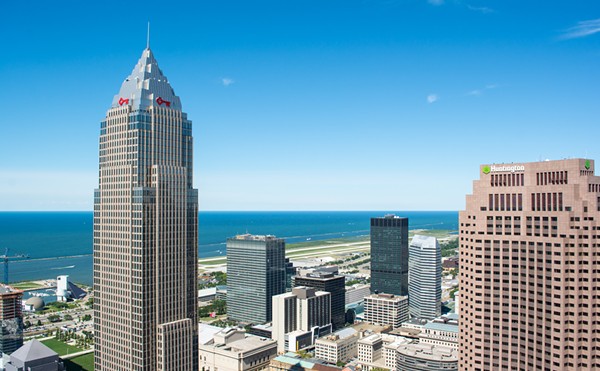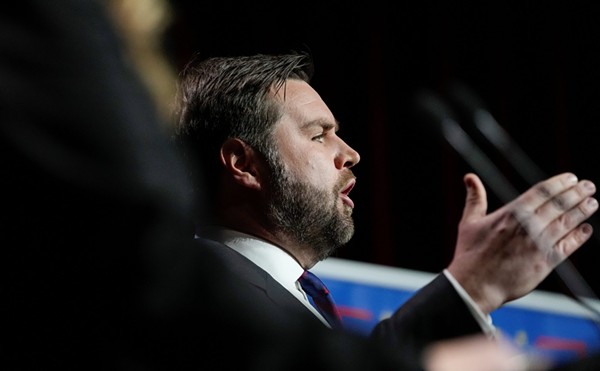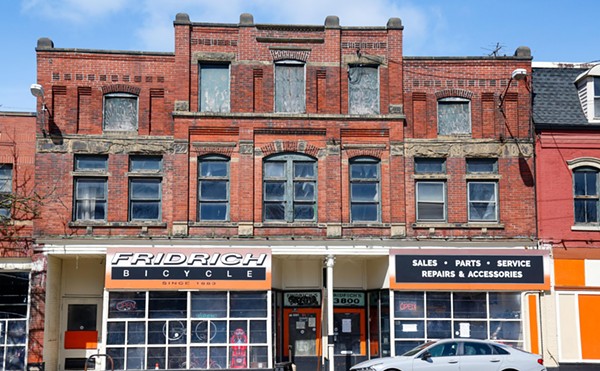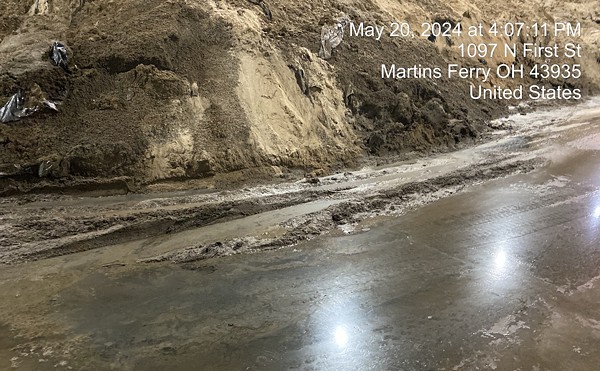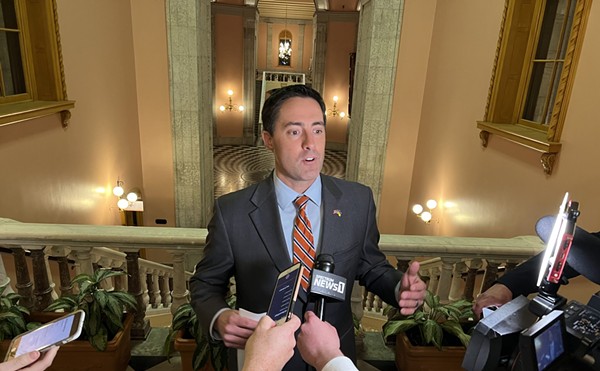The Secret Amazon Bid Dramatizes a Huge Cultural Problem in Cleveland. The Media Can Do Something About It
By Sam Allard on Mon, Jan 22, 2018 at 11:32 am
[
{
"name": "Ad - NativeInline - Injected",
"component": "38482495",
"insertPoint": "3",
"requiredCountToDisplay": "5"
},{
"name": "Real 1 Player (r2) - Inline",
"component": "38482494",
"insertPoint": "2/3",
"requiredCountToDisplay": "9"
}
]
Last week, Scene joined Jay Miller of Crain's Cleveland Business and Danielle Serino of WKYC for a panel discussion about Cleveland's failed Amazon bid on the WKYC evening program "Donovan Live."
Jimmy Donovan, the voice of the Browns and the host of the show, was keen to ask the panel why Cleveland didn't make Amazon's HQ2 shortlist. This is the question that folks are most curious about after the news, last week, that the Seattle-based online giant had selected 20 cities from a pool of 238 applications for consideration as the site of its second corporate headquarters. Cleveland was not among the final 20, but the question of "why" remains impossible to answer.
The city of Cleveland, Cuyahoga County and the private organizations who together crafted Cleveland's HQ2 bid have refused to release its contents — this has been publicized chiefly by Cleveland.com's Mark Naymik — so all the local press can do, when assembled for commentary, is shrug and speculate.
But impaneling Scene, Crain's and WKYC was both bizarre and illuminating, in the sense that our stated views described something approaching consensus. Together, we occupy about as broad a range of perspective as you're likely to find among Cleveland media outlets: the pouty, anti-authoritarian alt-weekly; the glossy, buttoned-up business press; and the TV news station favored among the 70+ set. Each of us obviously had different ways of expressing our positions, but we all felt that there was something deeply amiss about the secrecy of the Amazon bid.
The Donovan Live segment was a brisk five minutes, so it was difficult to delve into the many problems that the secrecy evokes. But the secrecy is not an isolated event. In fact it exemplifies an enormous cultural problem in Cleveland that, if unchecked, will continue to undercut the region's success.
With respect to the matter at hand (i.e., the Amazon bid secrecy): Scene's position is that the response from local media needs to be a strong and unified demand for Cleveland Mayor Frank Jackson, Cuyahoga County Executive Armond Budish, the Greater Cleveland Partnership's Joe Roman, Team NEO's Bill Koehler, the Northeast Ohio Areawide Coordinating Agency's Grace Gallucci and the rest of the regional leaders who worked on the bid to release it immediately. Mark Naymik has been badgering these agencies hard and often, and we all ought to follow his lead.
We mustn't accept these leaders' excuses and we mustn't print their quotes without a ruthless annotation of their quotes' senselessness, which senselessness should be noted as a hallmark of their recurring failures as elected and civic leaders working in the purported "public good."
In the first place, their lone justification for keeping the bid's information confidential has disappeared. Recall that when Cleveland submitted its bid, back in October, reporters were told that its contents were "proprietary." There was no elaboration. When some of us asked what information, exactly, made the bid proprietary, or how, their response was to repeat the initial denial: "It's proprietary."
But this is not the case. The bid is not proprietary, at least not in any legal sense. The communications departments of these various agencies (particularly the city of Cleveland itself), use "proprietary" as a magic word. They whip it out to fend off reporters.
In subsequent interviews, Frank Jackson and the chamber of commerce's Joe Roman were quoted saying that the Amazon bid had to be kept under wraps so that Cleveland could retain its competitive edge.
"It's all about winning," Roman said. Jackson's quote was more or less identical. Irony notwithstanding, both seemed to think this was a satisfactory justification.
It's worth noting that this argument was one that many other cities around the country trotted out too, but it's one that, as Mark Naymik wrote, made no sense. Every bid had already been submitted to Amazon at the time, so it's not like other cities could steal Cleveland's ideas. But even if the argument had been sound, it is now gone. Cleveland is no longer in the competition, so there is no longer a competitive edge to lose.
Naturally, our leaders have modified the position. Joe Roman told the Plain Dealer's Michelle Jarboe in her most recent write-up that the bid's information will remain a "trade secret" and will be stashed, ready for deployment, if and when another major corporation looks for a new home. Team NEO issued a press release to that effect as well, actually using the word "deployed."
"The content of the proposal will remain a protected business trade secret that will be deployed to benefit Cleveland in other nationally competitive economic development discussions," the statement read. (When Team NEO talks about "discussions," here, evidently they're referring to private ones.)
This cannot stand. This bid must be released for several reasons which we'll summarize quickly.
1) Releasing the bid is the public leaders' duty. This is information that presumably contemplates an enormous investment and/or sacrifice of public dollars. It is therefore public information. The various reports compiled for the bid, and the data therein, are public documents. There is no legal defense for keeping them secret. Amazon itself has said that the release of the information is entirely at the applicants' discretion. In its most recent communication with the press on this subject, the Mayor's Office said that they and their partners were meeting with their legal teams "to review what (if anything) is releasable" from the bid. That nonsense arrived in our inbox right about the time that the GCP and Team NEO were christening the bid's contents a "protected business trade secret."
2) Releasing the bid would allow taxpayers to compare Cleveland's package with those of the 20 finalists. If luring corporate giants to Cleveland is something that taxpayers are interested in, measuring ourselves against successful cities is an obvious strategy for self-improvement. When TV hosts like Jimmy Donovan (or family and friends) ask why Cleveland didn't make the cut, interested citizens will have some idea how to answer. Was it a public transit issue? The intelligence quotient of the workforce? The hellacious security line at Hopkins?
3) By the same token, releasing the bid would allow taxpayers to understand the lengths to which leaders were willing to go to entice a corporate giant. Seeing things like long-term tax incentives spelled out might help citizens determine that luring corporate giants is not something they're interested in. If the costs are so extreme as to render the benefits negligible or nonexistent, and if we have to debase ourselves by "racing to the bottom" by proposing financial incentives more extreme than other desperate American cities, taxpayers might reasonably want to opt out of the next sweepstakes.
4) Releasing the bid would fulfill elected leaders' obligation to (and stated concern for) transparency. Beyond the legal compulsion to release public information when it is requested, this information happens to be particularly newsworthy. Some of it might even be fun! Putting aside the financial implications of the tax incentives, citizens are fiendishly curious about big things that happen in town, and they want accurate, up-to-date information about them. They want to know, for example, which potential sites were offered to Amazon. Was Burke Lakefront Airport part of the equation? What about the Warehouse District parking lots adjacent to Public Square? (It goes without saying that this is also valuable information for reporters, who can then independently assess which sites might pose environmental risks, which sites might result in the displacement of businesses and residents, etc.)
5) This leads us to the ultimate point: Releasing the bid would allow the press to do its job, something that our region's leaders have shown zero interest in facilitating.
This is suppression, and it's an epidemic-level cultural problem in Cleveland.
The Amazon HQ2 secrecy circus is just one more powerful illustration in a series of recent illustrations that show how local leaders prefer to treat the independent press as the publicity arm of government — as propagandists.
What else to call it when leaders release no substantive information about the bid and instead feed the press quotes on the order of: "[the bid] is exciting" and "the City of Cleveland and our partners submitted a collaborative and strong proposal." Printing those quotes does not constitute reporting. That's just propaganda.
I spent much of 2017 reporting on the decision to close Public Square to buses and a deal to renovate the Quicken Loans Arena. Both of these long, complex stories that played out over several months were initially presented to the press and the public after decisions had been made about them behind closed doors. In the Q Deal’s case, despite a sustained and organized outcry, the fruits of those private decisions processed through local legislature entirely intact.
Amid the fanfare of the official Q Deal announcement ceremony, I asked Armond Budish about the county's purported "maxed out credit card." He was clearly annoyed, and denied that public spending on the Q Deal had anything to do with the county's strained finances. I then asked whether or not the $140 million price tag included interest on the bonds. All of the presenters onstage did some variant of rolling their eyes. Attorney Fred Nance was summoned from the front row to invoke the name of Art Modell and reflect on the region's weight class. In general, the attitude from these leaders was that reporters ought to be seeking quotes, not information.
It is my sense that this attitude is by now inbred among local leaders. They tend to feel that they are the region's masters, that it is their job — and theirs alone — to make the region's big decisions, and to do so in private. (To be fair, many of them are well-intentioned, and may sincerely believe that they are working in the region's best interest). But it is the press's job to be on their side, to report the benevolent leaders' decisions from the perspective of total euphoria, and to defend those decisions if anyone dares to question them.
Again, this must not stand.
There are signs of life from the local press, various beacons of whom have been so thoroughly suppressed that they may not even realize they’re suppressed. This often happens (nationally and locally) because many leading journalists prefer to stand among elites rather than in opposition to them. Locally, criticizing our leaders means calling out those we've been acculturated to trust, and those we aspire to be among. In some cases, it means calling out our own — the region’s top media figures are often honored with directorships or trusteeships at marquee institutions, and Plain Dealer alums are scattered among the C-suites of important local firms. It’s tricky and sometimes unpleasant work.
But Cleveland.com's Editor Chris Quinn, to his credit, pressed the mayoral candidates (in particular, incumbent Frank Jackson) about transparency on the 2017 campaign trail. And Quinn's ace columnist, Mark Naymik, is not letting the Amazon bid story die. They've been doing incisive, agenda-setting work.
Last week, no less than Crain's Jay Miller was agreeing with Scene on the nightly news. We were both nodding along to Danielle Serino, a former 19 Action News investigative reporter so often described as "feisty" that it may as well be part of her title.
Maybe a recognition has dawned that we are all on the same team. Maybe there’s a growing sense of journalistic kinship during these dark times, a renewed sense that as the local press we are indeed a corps. And now more than ever we are needed at the front.
Jimmy Donovan, the voice of the Browns and the host of the show, was keen to ask the panel why Cleveland didn't make Amazon's HQ2 shortlist. This is the question that folks are most curious about after the news, last week, that the Seattle-based online giant had selected 20 cities from a pool of 238 applications for consideration as the site of its second corporate headquarters. Cleveland was not among the final 20, but the question of "why" remains impossible to answer.
The city of Cleveland, Cuyahoga County and the private organizations who together crafted Cleveland's HQ2 bid have refused to release its contents — this has been publicized chiefly by Cleveland.com's Mark Naymik — so all the local press can do, when assembled for commentary, is shrug and speculate.
But impaneling Scene, Crain's and WKYC was both bizarre and illuminating, in the sense that our stated views described something approaching consensus. Together, we occupy about as broad a range of perspective as you're likely to find among Cleveland media outlets: the pouty, anti-authoritarian alt-weekly; the glossy, buttoned-up business press; and the TV news station favored among the 70+ set. Each of us obviously had different ways of expressing our positions, but we all felt that there was something deeply amiss about the secrecy of the Amazon bid.
The Donovan Live segment was a brisk five minutes, so it was difficult to delve into the many problems that the secrecy evokes. But the secrecy is not an isolated event. In fact it exemplifies an enormous cultural problem in Cleveland that, if unchecked, will continue to undercut the region's success.
With respect to the matter at hand (i.e., the Amazon bid secrecy): Scene's position is that the response from local media needs to be a strong and unified demand for Cleveland Mayor Frank Jackson, Cuyahoga County Executive Armond Budish, the Greater Cleveland Partnership's Joe Roman, Team NEO's Bill Koehler, the Northeast Ohio Areawide Coordinating Agency's Grace Gallucci and the rest of the regional leaders who worked on the bid to release it immediately. Mark Naymik has been badgering these agencies hard and often, and we all ought to follow his lead.
We mustn't accept these leaders' excuses and we mustn't print their quotes without a ruthless annotation of their quotes' senselessness, which senselessness should be noted as a hallmark of their recurring failures as elected and civic leaders working in the purported "public good."
In the first place, their lone justification for keeping the bid's information confidential has disappeared. Recall that when Cleveland submitted its bid, back in October, reporters were told that its contents were "proprietary." There was no elaboration. When some of us asked what information, exactly, made the bid proprietary, or how, their response was to repeat the initial denial: "It's proprietary."
But this is not the case. The bid is not proprietary, at least not in any legal sense. The communications departments of these various agencies (particularly the city of Cleveland itself), use "proprietary" as a magic word. They whip it out to fend off reporters.
In subsequent interviews, Frank Jackson and the chamber of commerce's Joe Roman were quoted saying that the Amazon bid had to be kept under wraps so that Cleveland could retain its competitive edge.
"It's all about winning," Roman said. Jackson's quote was more or less identical. Irony notwithstanding, both seemed to think this was a satisfactory justification.
It's worth noting that this argument was one that many other cities around the country trotted out too, but it's one that, as Mark Naymik wrote, made no sense. Every bid had already been submitted to Amazon at the time, so it's not like other cities could steal Cleveland's ideas. But even if the argument had been sound, it is now gone. Cleveland is no longer in the competition, so there is no longer a competitive edge to lose.
Naturally, our leaders have modified the position. Joe Roman told the Plain Dealer's Michelle Jarboe in her most recent write-up that the bid's information will remain a "trade secret" and will be stashed, ready for deployment, if and when another major corporation looks for a new home. Team NEO issued a press release to that effect as well, actually using the word "deployed."
"The content of the proposal will remain a protected business trade secret that will be deployed to benefit Cleveland in other nationally competitive economic development discussions," the statement read. (When Team NEO talks about "discussions," here, evidently they're referring to private ones.)
This cannot stand. This bid must be released for several reasons which we'll summarize quickly.
1) Releasing the bid is the public leaders' duty. This is information that presumably contemplates an enormous investment and/or sacrifice of public dollars. It is therefore public information. The various reports compiled for the bid, and the data therein, are public documents. There is no legal defense for keeping them secret. Amazon itself has said that the release of the information is entirely at the applicants' discretion. In its most recent communication with the press on this subject, the Mayor's Office said that they and their partners were meeting with their legal teams "to review what (if anything) is releasable" from the bid. That nonsense arrived in our inbox right about the time that the GCP and Team NEO were christening the bid's contents a "protected business trade secret."
2) Releasing the bid would allow taxpayers to compare Cleveland's package with those of the 20 finalists. If luring corporate giants to Cleveland is something that taxpayers are interested in, measuring ourselves against successful cities is an obvious strategy for self-improvement. When TV hosts like Jimmy Donovan (or family and friends) ask why Cleveland didn't make the cut, interested citizens will have some idea how to answer. Was it a public transit issue? The intelligence quotient of the workforce? The hellacious security line at Hopkins?
3) By the same token, releasing the bid would allow taxpayers to understand the lengths to which leaders were willing to go to entice a corporate giant. Seeing things like long-term tax incentives spelled out might help citizens determine that luring corporate giants is not something they're interested in. If the costs are so extreme as to render the benefits negligible or nonexistent, and if we have to debase ourselves by "racing to the bottom" by proposing financial incentives more extreme than other desperate American cities, taxpayers might reasonably want to opt out of the next sweepstakes.
4) Releasing the bid would fulfill elected leaders' obligation to (and stated concern for) transparency. Beyond the legal compulsion to release public information when it is requested, this information happens to be particularly newsworthy. Some of it might even be fun! Putting aside the financial implications of the tax incentives, citizens are fiendishly curious about big things that happen in town, and they want accurate, up-to-date information about them. They want to know, for example, which potential sites were offered to Amazon. Was Burke Lakefront Airport part of the equation? What about the Warehouse District parking lots adjacent to Public Square? (It goes without saying that this is also valuable information for reporters, who can then independently assess which sites might pose environmental risks, which sites might result in the displacement of businesses and residents, etc.)
5) This leads us to the ultimate point: Releasing the bid would allow the press to do its job, something that our region's leaders have shown zero interest in facilitating.
This is suppression, and it's an epidemic-level cultural problem in Cleveland.
The Amazon HQ2 secrecy circus is just one more powerful illustration in a series of recent illustrations that show how local leaders prefer to treat the independent press as the publicity arm of government — as propagandists.
What else to call it when leaders release no substantive information about the bid and instead feed the press quotes on the order of: "[the bid] is exciting" and "the City of Cleveland and our partners submitted a collaborative and strong proposal." Printing those quotes does not constitute reporting. That's just propaganda.
I spent much of 2017 reporting on the decision to close Public Square to buses and a deal to renovate the Quicken Loans Arena. Both of these long, complex stories that played out over several months were initially presented to the press and the public after decisions had been made about them behind closed doors. In the Q Deal’s case, despite a sustained and organized outcry, the fruits of those private decisions processed through local legislature entirely intact.
Amid the fanfare of the official Q Deal announcement ceremony, I asked Armond Budish about the county's purported "maxed out credit card." He was clearly annoyed, and denied that public spending on the Q Deal had anything to do with the county's strained finances. I then asked whether or not the $140 million price tag included interest on the bonds. All of the presenters onstage did some variant of rolling their eyes. Attorney Fred Nance was summoned from the front row to invoke the name of Art Modell and reflect on the region's weight class. In general, the attitude from these leaders was that reporters ought to be seeking quotes, not information.
It is my sense that this attitude is by now inbred among local leaders. They tend to feel that they are the region's masters, that it is their job — and theirs alone — to make the region's big decisions, and to do so in private. (To be fair, many of them are well-intentioned, and may sincerely believe that they are working in the region's best interest). But it is the press's job to be on their side, to report the benevolent leaders' decisions from the perspective of total euphoria, and to defend those decisions if anyone dares to question them.
Again, this must not stand.
There are signs of life from the local press, various beacons of whom have been so thoroughly suppressed that they may not even realize they’re suppressed. This often happens (nationally and locally) because many leading journalists prefer to stand among elites rather than in opposition to them. Locally, criticizing our leaders means calling out those we've been acculturated to trust, and those we aspire to be among. In some cases, it means calling out our own — the region’s top media figures are often honored with directorships or trusteeships at marquee institutions, and Plain Dealer alums are scattered among the C-suites of important local firms. It’s tricky and sometimes unpleasant work.
But Cleveland.com's Editor Chris Quinn, to his credit, pressed the mayoral candidates (in particular, incumbent Frank Jackson) about transparency on the 2017 campaign trail. And Quinn's ace columnist, Mark Naymik, is not letting the Amazon bid story die. They've been doing incisive, agenda-setting work.
Last week, no less than Crain's Jay Miller was agreeing with Scene on the nightly news. We were both nodding along to Danielle Serino, a former 19 Action News investigative reporter so often described as "feisty" that it may as well be part of her title.
Maybe a recognition has dawned that we are all on the same team. Maybe there’s a growing sense of journalistic kinship during these dark times, a renewed sense that as the local press we are indeed a corps. And now more than ever we are needed at the front.
Tags:
SCENE Supporters make it possible to tell the Cleveland stories you won’t find elsewhere.
Become a supporter today.
About The Author
Sam Allard
Sam Allard is the Senior Writer at Scene, in which capacity he covers politics and power and writes about movies when time permits. He's a graduate of the Medill School of Journalism at Northwestern University and the NEOMFA at Cleveland State. Prior to joining Scene, he was encamped in Sarajevo, Bosnia, on an...
Scroll to read more Cleveland News articles
Newsletters
Join Cleveland Scene Newsletters
Subscribe now to get the latest news delivered right to your inbox.





